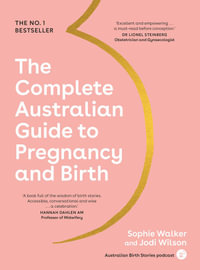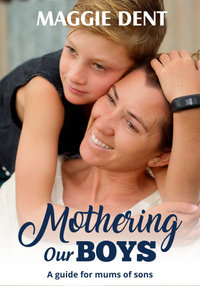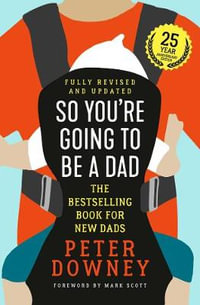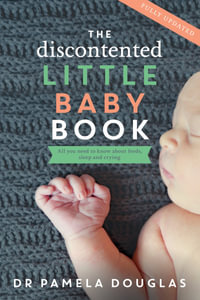
Future-Proofing Your Child
Help Your Children Grow into Sensible, Safe, Happy, Resilient, Self-Motivated Teens and Beyond
By: Kathy Walker
Paperback | 24 June 2015 | Edition Number 1
At a Glance
240 Pages
23.3 x 16.0 x 1.8
Paperback
RRP $35.00
$32.75
or 4 interest-free payments of $8.19 with
orShips in 3 to 5 business days
We are so intensely involved in keeping our children happy in the present that we don't consider what this means for their emotional state in the future. Teens and young adults are especially vulnerable to peer pressure and mental health issues, but you can give your children the tools to prepare them for independent, safe, happy teenage years and beyond. Learn how important it is to establish boundaries, discipline and good role models so that children can develop the necessary qualities to deal with whatever comes their way.
It's all about guiding your children to:
- make good decisions
- forge good relationships
- respect other people
- have good communication skills
- develop self-discipline and motivation
- and develop resilience and emotional intelligence.
About the Author
Kathy Walker is one of Australia's leading parenting and education experts, public speakers and authors. In 2012 and 2014 she was nominated for Australian of the year and in 2014 was awarded an Order of Australia (OAM). Her books include: Ready Set Go - School Readiness and Preparation, Parenting, What's the Hurry, Play Matters and Engagement Matters.
The trouble with being a parent is that by the time you are experienced, you are unemployed.
Anon.
As an educator, it never ceases to amaze me how parents happily take on the incredibly challenging job of raising kids without any training at all. We are taught to do so many things in life. We are taught to read and write at school, we are trained for our careers through university courses and apprenticeships and we seek out teachers, coaches, mentors and gurus for pretty much every area of human endeavour: from dancing, to cake-decorating, to composting. Yet when we have children, we expect that we will 'naturally' know how to be parents.
Like parents across most Western nations, we also assume that parenting is an in-house affair: that parents should be left to make it up as they go along and that society should only assist or interfere if something goes wrong. Unlike families in the rest of the world, the vast majority of us don't raise our children with the hands-on support of extended families in strong communities, and many of us feel isolated and lost, lacking in confidence and unsure of where to turn for help.
Part of my job is to give talks to parent and community groups about important topics such as building resilience, encouraging positive social skills in young children and helping families to communicate effectively. I love my work. I love watching the relief on parents' faces when they realise that they are not alone and that they don't have to be perfect, and the wonder in their expressions when they understand their children's behaviour from a developmental perspective.
As children develop, their needs change and to parent effectively we must constantly rethink our strategies to meet those needs. Not only that, but our world is becoming more and more complex and there is no one-size-fits-all approach to managing the increasing number of decisions we feel pressured to make. Parents are not only asking questions such as, 'What time should my seven-year-old go to bed?' 'How can I get my child to eat more vegetables?' and 'How do I stop yelling at my kids?' but also 'Should I book kiddie gym lessons for my six-month- old?' 'When should my son start piano lessons?' and 'Should I get my daughter a smart phone?' These may sound like far less important questions than those pertaining to sleep, nutrition and emotional health, but I would argue that our lifestyle choices set up patterns of thinking and behaviour that affect the child, the rest of the family and, by implication, the wider community.
We all care deeply about raising our children and want to do the best we can. Yet the number of children in this country who have screens in their bedrooms, who eat takeaway in front of the TV, who play excessively on their computers and mini screens, and who are overscheduled, overindulged and overtired is epidemic. Well-meaning parents are racing to book their babies into swimming classes, their toddlers into letter and number classes, and their preschoolers into gymnastics or music lessons. They are organising 'makeup' parties for five-year-old girls, or forking out big dollars for professional entertainers and caterers at preschool birthday parties. Children are given everything they ask for, and are either plugged in and tuned out or rushed from one activity to the next without a moment to spare. They rarely experience the frustration and disappointment of failing or missing out and instead are given a round of applause for every miniscule 'achievement', whether deserved or not. We then wonder why so many of our young people fall apart when life doesn't work out the way they hoped, developing anxiety, depression and addictions.
Parents often tell me, 'I know we shouldn't be doing so many things after school but he really wants to do them, and I don't want him to miss out,' or 'If I don't let her go to the sleepover party, she will be the odd one out,' or 'I know he shouldn't be on the computer for so long, but he just wears me down and I say yes for the sake of peace.' I hear comments like this every single day of my working week! These parents want the best for their children but are confused by the conflicting messages they hear from other parents and the media, and from what they have learned in their own families. They lack confidence in their own parenting and worry about the choices that their children will make in adolescence. Will they be safe? Will they be okay?
Our job as parents is to prepare our children for their adult lives, and if we do it right, we will do ourselves out of a job. In other words, our children will learn to parent themselves – they will be able to live independently, safely and happily. They will be able to find a job, a partner and somewhere to live, and be able to make life choices that give them the best chance at health and happiness. But what does it mean to be happy? Is it an underlying hum of wellbeing and contentment, or is it more like a fleeting explosion of joyous excitement? Does it even make sense to describe it as a feeling? Or is it more a way of being? However you define it, happiness is not something you can control – it tends to turn up when you least expect it. However, there is one thing parents can do to give children the greatest chance of experiencing happiness and that is to help them develop resilience. Resilience is the ability to bounce back and try again when things go pear-shaped, to have a go at something new and to be willing to ask for help. It's not about being 'brave' or 'strong' but about feeling okay about yourself, and knowing that you will get through whatever life dishes up. In other words, it is our ability to adapt to stress; and the less stressed we are, the more space there is for happiness.
Children learn resilience through their family relationships: by feeling supported and loved; by watching their parents talk to each other, listen to each other, express feelings and resolve conflict; by being encouraged to think positively; and by being given opportunities to make mistakes, miss out and cope with disappointment.
Good communication builds positive family relationships, and a strong connection is crucial if parents are going to be able to set limits on their children's behaviour and follow through with consequences. This all sounds quite obvious, yet in our time-poor society many parents work long hours and some don't even see their children in the mornings or evenings during the week. Building strong relationships requires us to make time. To remind ourselves that rushing around focusing on the 'doing' rather than the 'being' isn't always what is most needed in these early years. This means reducing the number of structured activities in your child's week.
Many parents seem uncomfortable with unstructured time, as if we are worried that our children will miss out if they are not being tutored or coached in some sporting, academic or creative endeavour. And we are so accustomed to the constant stimulation provided by the myriad screens that some of us don't even know how to sit together to eat a meal without the TV blaring or the smart phone screen glaring.
We need to focus on the ordinary time we spend with our children: the ride home in the car, the tucking into bed at night, the morning cuddle, the ride or walk to childcare or school, the meal together at night. Each of these moments is an opportunity to ask them about what they are interested in, how they feel, what they care about, and to listen to their answers without judging or correcting or interrupting. In this way, we are 'in the moment' with our children instead of being distracted by the next thing on our endless mental list of things to do. When children sense that we are really there with them – that we are truly listening – they feel valued, respected and secure and are more able to cope when we need to set limits on their behaviour.
The parents I see have no problem building a loving connection with their kids but many struggle when it comes to setting limits. They find it difficult to cope when their children become angry or resentful – and this is inevitable if children do not get their own way. Yet learning to cope with disappointment makes up the lion's share of what we call 'growing up'.
But here's the rub. After thirty years as a parenting educator I have learned that babies, toddlers and primary-schoolchildren learn more from what their parents do than what parents say. We cannot help our children learn to manage their anger if we are constantly flying off the handle, or storming off into another room and slamming the door. (My personal favourite is the parent who screams at his or her child, 'Stop yelling!') We cannot teach our children how to be assertive if we do not know how to say no. Future-proofing, then, requires honest self-reflection, as well as a willingness to acknowledge the thoughts and feelings that drive our own behaviour and to explore the values that underlie our life choices.
When it all seems too hard and we wish that our children would change, or that the world would slow down, it is truly empowering to know that the answers lie within us. But I am going to be honest – there are no quick fixes. The most effective parenting strategies require long-term commitment on your part.
Ask any parent what they want for their children and most will answer that they want them to have happy and successful lives. But what is success? To my mind, success has nothing to do with wealth or status, and everything to do with who we are as people. 'Successful' people are those who display key characteristics:
- Resilience: this is the ability to bounce back, to have a go, to try again, to not give up, to make the most of opportunities.
- A realistic and positive sense of self: this is about how we view ourselves. Our internal view and belief about ourselves. Regardless of whether sometimes things don't go the way we may want, we hold a reasonably firm perspective of ourselves.
- An ability to handle emotions and deal with conflict. It is important to be able to regulate and manage ourselves throughout life. To be able to handle our emotions, particularly when we are angry, frustrated or fearful, to be able to work through rather than to lash out, to hurt ourselves or others, is a very critical life skill.
- Respect for diversity of thought, views and values. The reality of life is that it is diverse. Acceptance of other views, beliefs and values helps local and global communities exist and work together peacefully.
- A willingness to ask questions and listen to the answers. Being able to seek assistance and support, and accept the responses from others is an invaluable aspect of life. There will be always times when we need information and need to be open to the responses of others in our lives.
Gold Nuggets
If I had to distil all of my parenting strategies to a list of the top three, it would be these:
- Really listen to your children.
- Always end each day with love.
- Never discipline when you are angry.
ISBN: 9780670076277
ISBN-10: 9780670076277
Published: 24th June 2015
Format: Paperback
Language: English
Number of Pages: 240
Audience: General Adult
Publisher: Penguin Australia Pty Ltd
Country of Publication: AU
Edition Number: 1
Dimensions (cm): 23.3 x 16.0 x 1.8
Weight (kg): 0.32
Shipping
| Standard Shipping | Express Shipping | |
|---|---|---|
| Metro postcodes: | $9.99 | $14.95 |
| Regional postcodes: | $9.99 | $14.95 |
| Rural postcodes: | $9.99 | $14.95 |
Orders over $79.00 qualify for free shipping.
How to return your order
At Booktopia, we offer hassle-free returns in accordance with our returns policy. If you wish to return an item, please get in touch with Booktopia Customer Care.
Additional postage charges may be applicable.
Defective items
If there is a problem with any of the items received for your order then the Booktopia Customer Care team is ready to assist you.
For more info please visit our Help Centre.
























